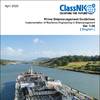BIMCO and Shipdex have signed an agreement to support the development and exchange of technical and logistic data across the shipping community, and to include BIMCO as an executive member of Shipdex steering committee.
The agreement was signed at BIMCO Head office, Copenhagen by Lars Robert Pedersen, BIMCO Deputy Secretary General and representatives from the original nine executive members – Grimaldi Group S.P.A., Mastermind Shipmanagement Ltd., Alfa Laval Tumba AB, MacGregor Group AB, Man Diesel & Turbo SE, Shipdex Consulting Ltd, Yanmar Company Ltd., G&C Shipping Ltd. and Rolls Royce PLC.
The two organisations share a common interest to promote the standardisation and digitalisation of data exchange in the shipping industry, with recently elected BIMCO President Anastasios Papagiannopoulos, setting it out as a key theme for his presidential term.
Lars Robert Pedersen, Deputy Secretary General at BIMCO said: "This new venture will be of great benefit to our members and will complement BIMCO’s exciting portfolio of products and services. Shipdex fits neatly with our objective to help ease the administrative burdens for ships and masters. Shipowners will be able to reduce time, administration and costs as this new system is quicker and easier to use, with zero disruption to the ship at sea."
Shipdex Chairman, Giancarlo Coletta said: "We welcome BIMCO as an Executive Member of the Shipdex Protocol, as we work with the shipping industry to exchange electronic technical data between all parties, in a safe, reliable and effective way. We are convinced that Shipdex Protocol is the best candidate to became the universal standard for the exchange of technical data."
"Securing the support of the final user is the next step ahead for the diffusion of real electronic documentation, when this happens the industry will save money, time, paper and space because Shipdex Protocol has all the necessary features to became the universal standard for shipping industry," Giancarlo added.
The Shipdex Protocol is designed to be used by shipowners, shipyards, manufacturers, classification societies and application service providers, it uses a common source database to store, retrieve, publish and exchange technical and logistic data across the shipping community.










